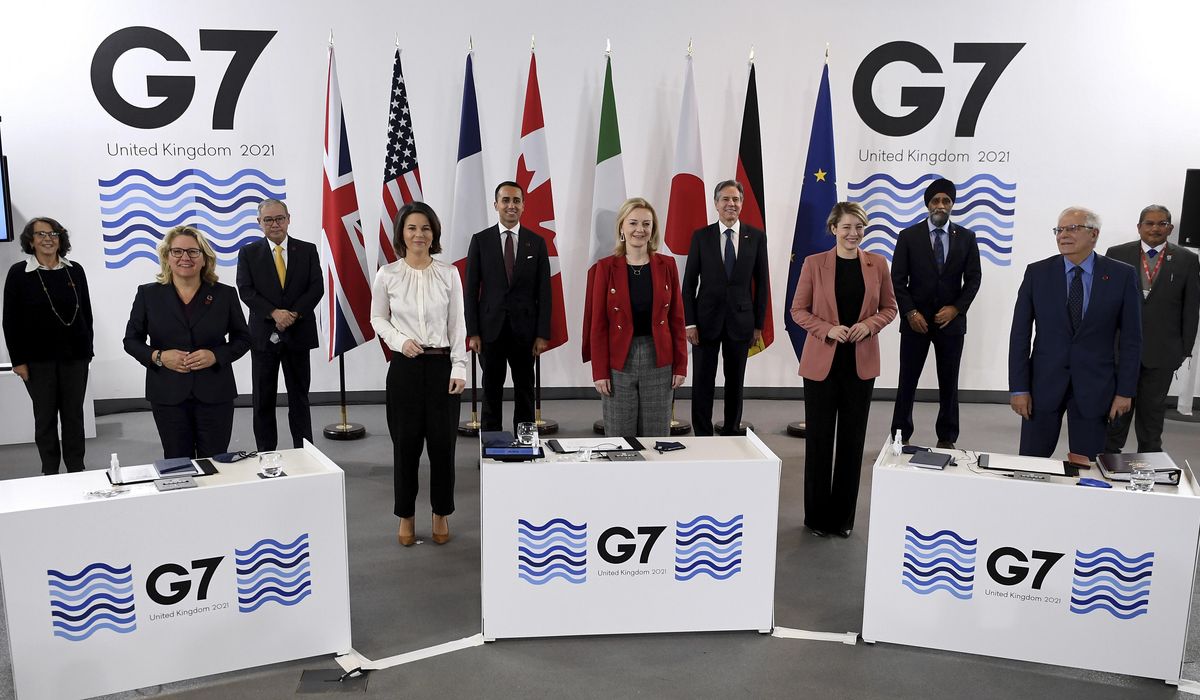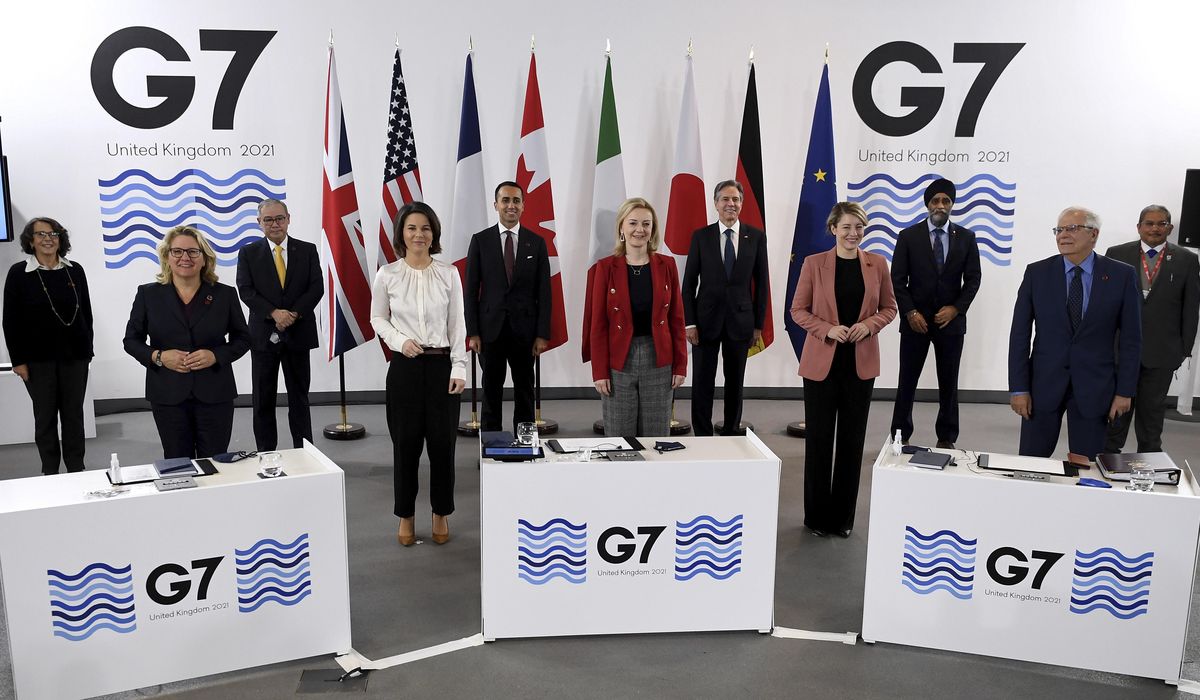
Foreign ministers of the Group of Seven nations meeting Sunday in England issued a blunt warning to Russia to draw down forces that have massed on Ukraine’s border, accusing Moscow of trying to intimidate its smaller neighbor and vowing strong joint action if Russia does not relent.
The G-7 industrial powers — the U.S., Canada, Britain, France, Germany, Italy and Japan, joined by the European Union — “are united in our condemnation of Russia’s military build-up and aggressive rhetoric towards Ukraine,” the ministers said in a statement from Liverpool, where they had been meeting for two days.
“Any use of force to change borders is strictly prohibited under international law,” the statement said. “Russia should be in no doubt that further military aggression against Ukraine would have massive consequences and severe cost in response.”
U.S. and NATO officials say about 175,000 Russian troops have been massing at or near the Ukrainian border in recent months. U.S. intelligence assessments say Mr. Putin has the resources in place to launch an invasion early next year.
The security news website TheDrive.com reported Friday that social media videos showed flatbed trucks on the Russian side of the border loaded with Buk-M1 medium-range surface-to-air missiles. Military analysts say the Buk would likely be deployed to provide air defense for Russian troops and materiel should Moscow order an invasion.
President Biden’s two-hour video conference with Russian President Vladimir Putin last week appears to have lowered the crisis atmosphere a bit, but the G-7 statement was a clear sign that the underlying clash of interests is far from resolved, Secretary of State Antony Blinken said Sunday on NBC’s “Meet the Press.”
The U.S. and its European partners “are looking to see Russia pull back forces from the border, and we’re looking to see Russia engage in good faith in diplomacy, in diplomatic dialogue with the Europeans, with Ukraine, to resolve the conflict in eastern Ukraine, and to give Ukraine its borders back,” Mr. Blinken said.
The secretary said he hopes diplomacy will resolve the impasse. “We’ve made clear as well that there would be massive consequences if Russia commits renewed acts of aggression against Ukraine,” he said.
British Foreign Secretary Liz Truss, who hosted the G-7 meeting, told reporters in Liverpool that the industrial powers were “considering all options” if Russia takes military action in Ukraine, including a revision of Britain’s money laundering laws to target Russian elites known to keep their vast wealth in overseas accounts.
The Kremlin said it is the West that has been bulking up forces in NATO countries along Russia’s border while increasing its military support for Ukraine and refusing to rule out the prospect that Kyiv may one day join the Western military alliance.
Russian officials said Washington and its allies have summarily dismissed their offers to resolve the crisis and discuss new security rules of the road for Ukraine the region.
“Russia has made numerous offers to NATO on ways to decrease tensions. The G7 forum could be an opportunity to discuss them, but so far we hear nothing but aggressive slogans,” the Russian Embassy in London said in a statement Saturday, even before the G-7 released the meeting’s communique.
Pipeline pressure
Mr. Biden has ruled out for now U.S. troop deployment to help Ukraine’s defense but has balked at Russian demands for a guarantee that Ukraine will never be invited to join NATO. Mr. Blinken and others have talked of unprecedented economic measures — including an attack on the ruble and cutting off Russian financial institutions from the international money-clearing system — if Moscow takes further military action against Ukraine.
The secretary of state noted another potential point of vulnerability for Russia: the nearly completed Nord Stream 2 gas pipeline into Germany that the Kremlin has long coveted.
“That pipeline … doesn’t have any gas flowing through it right now,” Mr. Blinken said on “Meet the Press.” “And, in fact, it’s a source of leverage on Russia because to the extent President Putin wants to see gas flowing through that pipeline — if and when it becomes operational — it’s very unlikely or hard to see that happening if Russia has renewed its aggression on Ukraine.”
Russia, which seized the Crimean Peninsula from Ukraine in 2014, has been backing a pro-Moscow separatist revolt in eastern Ukraine. The conflict with the central government has claimed more than 14,000 military and civilian lives.
Russia says Kyiv has balked at multilateral negotiations designed to resolve the separatist crisis, but the G-7 ministers said Sunday that Russia is to blame for the soaring tensions of recent months.
“We reaffirm our unwavering commitment to Ukraine’s sovereignty and territorial integrity, as well as the right of any sovereign state to determine its own future,” the statement said. “We commend Ukraine’s posture of restraint.”
The State Department announced Sunday that Karen Donfried, the assistant secretary for the Bureau of European and Eurasian Affairs, would travel to Kyiv and Moscow this week to “discuss Russia’s military buildup and to reinforce the United States’ commitment to Ukraine’s sovereignty, independence and territorial integrity.”
The prospects of a deepening cold war and of a hot war breaking out in the heart of Europe have drawn more players into the push for a peaceful settlement. Pope Francis, addressing a Sunday crowd in St. Peter’s Square at the Vatican, called for renewed dialogue and urged both sides to avoid armed conflict.
In his first direct remarks on the conflict, the pontiff expressed sympathy for “dear Ukraine, for all its churches and religious communities and for all of its people, so that tensions there are resolved through a serious international dialogue and not with weapons.”
“Weapons are not the path to take. May this Christmas bring peace to Ukraine,” the pope said, according to The Associated Press.
Mr. Putin has said repeatedly that Western allies are ignoring Russia’s security “red lines” in Ukraine and across the borders Russia shares with several Eastern European NATO members.
But foreign policy analysts say Mr. Biden and Mr. Blinken face a difficult task in determining the Russian leader’s bottom line.
In the face of such uncertainty, according to Nigel Gould-Davies, a senior fellow at the International Institute for Strategic Studies and a former British ambassador to Belarus, it would be too dangerous for the West to assume that Mr. Putin is bluffing or that forcing Ukraine to accept some of Russia’s demands would ease the crisis.
“Russia’s words and actions offer no assurance that its aims are limited,” Mr. Gould-Davies wrote in an analysis for Foreign Policy.com.
“It is threatening force to demand unilateral concessions while it continues to occupy the territory of a sovereign state …,” he added. “If Tuesday’s Biden-Putin meeting revealed anything, it is that pursuing deterrence is essential.”
- This article is based in part on wire service reports.







